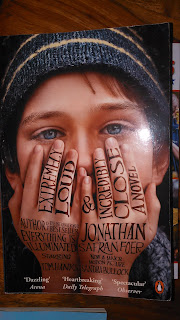Just occasionally, there comes along a book that blows me away. In this case, I am rather late to the party, but there are good reasons for that, which we will see later. On holiday, I found this book, and thought I would give it a go, and I found an absolute gem of a book.
It was interesting that one of the influences on this book was Kurt Vonnegurt's Slaughterhouse Five, which I had just started reading at the same time. That was odd. Another influence is probably Laurence Stern and Tristram Shandy (another clever book), or possibly James Joyce, but without the incomprehensibility. It is a novel that relies on the book format, and uses that format cleverly and intelligently.
OK, there is a reason why I would probably have avoided this book when it first came out (some ten years ago). The event that triggered off my depression was the 9/11 attacks on the World Trade Centre, and I have tended to avoid references and discussion of this, because I have found it triggery. I noted that this book had references to this, but I hadn't realised quite how closely connected it was. However, I found this story therapeutic instead, probably because of the way that it was written.
The story is told from the perspective of a 9 year old Oskar Schell, working through his dads death in the 9/11 attack. He finds a key that he believes will help him find out more about his dad, and he spends a lot of the book looking for the lock that fits the key - which one of some 16Bn locks in New York. When he finds the answer to this puzzle, it doesn't, in fact, bring him closer to his dad, but the search has enabled him to move on. He doesn't find the answers that he wanted, but he does find some resolution. In truth, as I read this and worked through Oskars loss, I also found some answers, some resolution.
There is another story behind this, which is Oskars grandfather in Dresden during the bombing. There is, I think, a parallel between the devastation in Dresden, and the resultant rebuilding of lives beyond this - leading, two generations later to Oskar - and the necessary rebuilding of lives after 9/11. It is a story of rebuilding after destruction. It is a story of finding answers that are not necessarily the answers to the questions we are asking. It is the story of finding meaning in the meaningless.
In Oskars search for meaning, a search that is ultimately fruitless but in which he does find answers, I have found healing for some of my pain, for some of the struggles I have had.
That was most unexpected.
Because the story is written from the view of a 9 year old, there is a rawness of emotion expressed that is often glossed over by older people. There is an expectation of finding meaning that is far more hopeful than most adults have. There is a reality and a belief that the cynicism of age tends to dull. Most of all, there is an acceptance, at the end, that there is no meaning to be found. Oskar handles this because he has been on this journey, because he has spent time trying to find meaning. In the end, he is not distraught that there is no answer - he realises that he was asking the wrong question in the first place.
I think so often I ask the wrong questions. I then get frustrated when I cannot find answers. In Oskars search and revelation, there is a reminder that sometimes, I need to take the answer given, and search back for the question.
---
I am sorry that this posting has taken so long to get out. I have had an interesting and challenging few weeks, and have not been able to get any posts to a finished state. There are plenty more in a started state, plenty of ideas brewing, but finishing them has proved difficult. I hope I can do better in the weeks to come! Thank you.
Monday 27 July 2015
Subscribe to:
Post Comments (Atom)


No comments:
Post a Comment